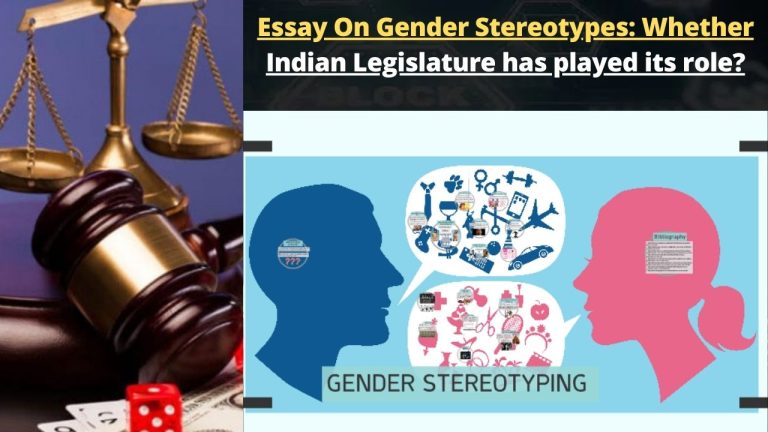"Advertisement"
What role has the Indian legislature played in eradicating gender stereotypes?
Hello My Dear Friend, In this post “Essay On Gender Stereotypes: Whether Indian Legislature has played its role?“, We will be going to read about Gender Stereotypes: Whether Indian Legislature has played its role as an Essay in detail. So…
Let’s Start…
Essay On Gender Stereotypes: Whether Indian Legislature has played its role?
Introduction:
There have long been gender stereotypes present in communities all around the world, including India.
Based on these preconceptions, people are expected to perform particular duties, exhibit certain behaviors, or meet certain standards.
In Indian society, misconceptions about women’s roles in the home, submissiveness, and lack of decision-making authority are frequently perpetuated.
The Indian legislature has taken action over the years to combat gender inequity and dispel these prejudices.
This study investigates the extent to which gender stereotypes have been successfully challenged by the Indian legislature.
Historical Context:
It is critical to take into account the historical backdrop in order to comprehend the advancements made by Indian legislation in overcoming gender stereotypes.
The Indian Constitution, which established equality and fundamental rights for all people, regardless of gender, in 1950, marked the beginning of India’s road toward achieving gender parity.
The lawmakers understood the significance of establishing equality for men and women and eliminating gender stereotypes.
Legislative Measures:
The Indian government has put in place a number of policies to combat gender stereotypes and advance gender equality.
The Dowry Prohibition Act of 1961, which sought to end the practice of dowry, a deeply ingrained stereotype that devalues women and commercializes marriage, is one of the historic laws.
By making the giving and receiving of dowries illegal, this measure gave women legal protection.
The Maternity Benefit Act of 1961, which provides maternity leave and benefits to women employees, is another important piece of legislation.
This law guarantees women’s access to unpaid leave from work and recognizes women’s biological role in delivery.
By passing this legislation, the legislature dispels the myth that women’s primary responsibilities are limited to household chores.
Another crucial action made by the legislature is the Sexual Harassment of Women at Workplace (Prevention, Prohibition, and Redressal) Act of 2013.
This law attempts to make the workplace a safe and welcoming place for women while acknowledging the frequency of workplace harassment.
It supports the notion that women deserve respect and safety, dispelling the myth that they are fundamentally weak or easy targets for abuse.
Additionally, the legislature has been instrumental in changing legislation governing property rights.
In an effort to dispel the myth that only males can inherit family property, the Hindu Succession Act of 1956 was revised in 2005 to provide daughters with the same inheritance rights as sons.
This reform sought to eliminate ingrained gender inequalities in inheritance laws while also empowering women economically.
Impact and challenges:
Although the Indian government has made tremendous strides to combat gender stereotypes, their effectiveness and influence have faced difficulties.
The disconnect between the law and everyday life is one of the biggest problems.
Despite the existence of progressive laws, cultural norms, deeply ingrained patriarchal views, and a lack of understanding contribute to the persistence of gender stereotypes in Indian society.
Stereotypes cannot be eliminated entirely through legislative means alone; society’s attitudes and behavior must change.
Enforcing current legislation is another difficulty. Implementation problems with many gender-related laws are frequently brought on by a lack of funding, a general lack of public awareness, and a sluggish legal system.
These issues may prevent legislation from having the desired effect because people may not be aware of their legal rights or have trouble getting justice.
In addition, it’s important to recognize that laws aren’t the only thing that perpetuates gender stereotypes. Stereotypes are ingrained in educational institutions, media depictions, and cultural practices.
It takes a comprehensive strategy including many stakeholders to effectively combat gender stereotypes. Along with the legislature, this also encompasses civil society organizations, educational institutions, the media, and the general public.
Conclusion:
In conclusion, the Indian legislature has been instrumental in promoting gender equality and questioning gender norms.
It has sought to end harmful practices, offers legal protections, and give women equal rights through a variety of laws.
However, practical issues and societal attitudes still make it difficult to effectively eradicate gender stereotypes. A coordinated effort involving many parties is required to address these issues.
Together, we can make further progress in India towards a gender-neutral society where both men and women can prosper.
Finally, Thanks For Reading “Essay On Gender Stereotypes: Whether Indian Legislature has played its role?“.
If you have any questions related to “Essay On Gender Stereotypes: Whether Indian Legislature has played its Role?“, So, please comment below.
Must Read:
Essay On Judicial backlog: Can Artificial Intelligence be the answer?
